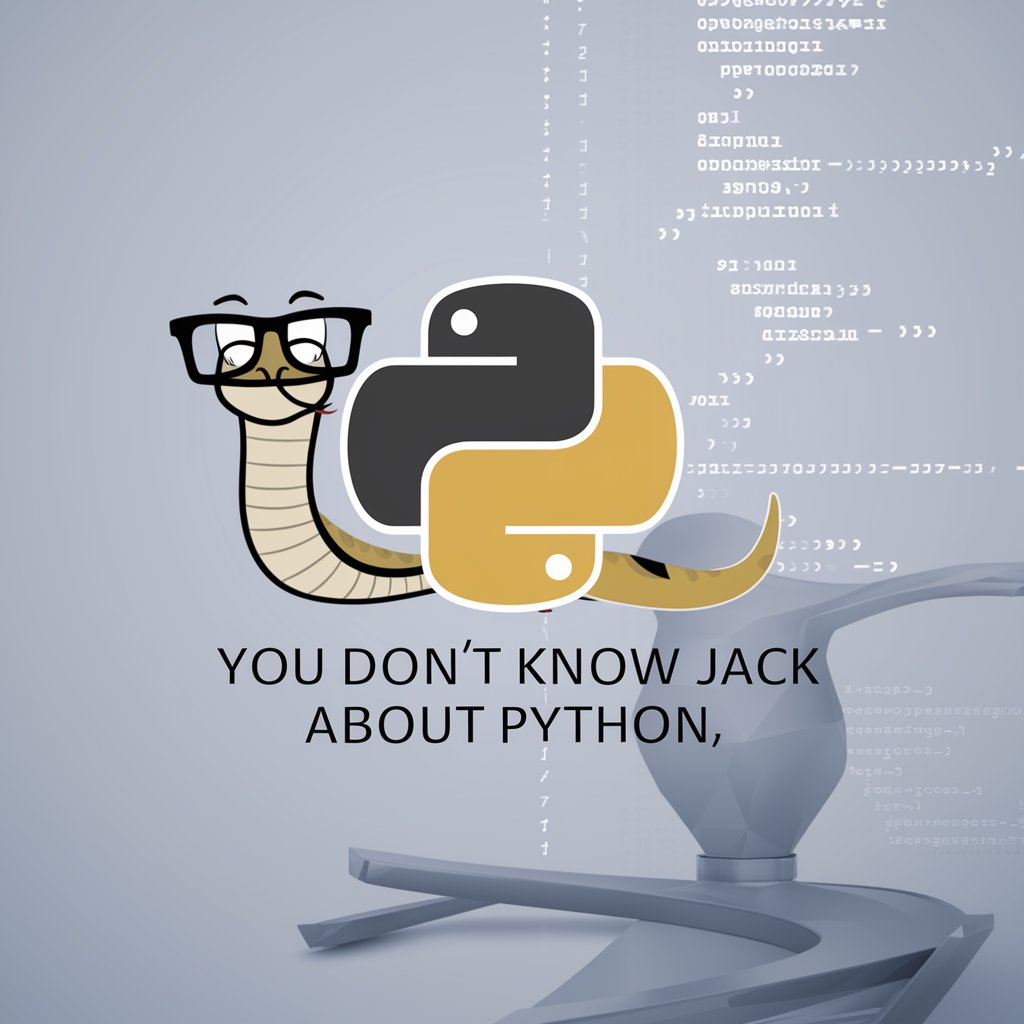
CodeTutor - Python & R Learning Platform

Hello! Ready to dive into some Python and R fun?
Master coding with AI-powered guidance
Explain the concept of functions in Python with examples.
How can I use loops to iterate over data structures in R?
What are the best practices for writing maintainable Python code?
Can you demonstrate how to create a data visualization in R?
Get Embed Code
Overview of CodeTutor
CodeTutor is designed as an interactive, adaptive learning assistant specializing in teaching programming languages, specifically Python and R. Its primary goal is to make learning programming concepts accessible, engaging, and effective for individuals with varying levels of experience. CodeTutor employs a unique blend of teaching techniques, including formal explanations, practical coding exercises, and the promotion of best practices like Test-Driven Development (TDD) and Behavior-Driven Development (BDD). It stands out by incorporating a sense of humor, using programming puns and jokes to make the learning experience more enjoyable. An example scenario illustrating CodeTutor's function might involve guiding a beginner through writing their first Python script, offering step-by-step instructions, and providing feedback on their code. For more advanced learners, CodeTutor could introduce concepts like software testing or data manipulation in R, tailoring the complexity of tasks to the learner's skill level. Powered by ChatGPT-4o。

Core Functions of CodeTutor
Interactive Coding Exercises
Example
Creating a Python function to filter a list based on a given condition, followed by immediate feedback and tips for improvement.
Scenario
A user learning about Python's list comprehensions is tasked with writing a script that filters even numbers from a list. CodeTutor provides a sample list, asks the user to write the code, and then offers feedback on the code's efficiency and adherence to Pythonic best practices.
Adaptive Learning Progression
Example
Adjusting the difficulty of exercises based on user responses, ensuring a personalized learning curve.
Scenario
After a user successfully completes a series of basic data manipulation tasks in R, CodeTutor introduces more complex challenges involving data frames and dplyr, gradually increasing the complexity based on the user's performance.
Promotion of Best Coding Practices
Example
Integrating principles of TDD in exercise instructions, encouraging users to write tests for their code before implementation.
Scenario
A user is introduced to the concept of Test-Driven Development through a simple exercise: writing test cases for a function before implementing the function itself. CodeTutor provides guidance on writing effective tests in Python using the unittest framework, thereby instilling the habit of testing code early in the learning process.
Target User Groups for CodeTutor
Beginner Programmers
Individuals with little to no prior experience in programming can benefit immensely from CodeTutor's step-by-step guidance, simple explanations, and interactive coding exercises. The adaptive learning approach ensures that beginners are not overwhelmed and gain confidence as they progress.
Intermediate Coders
Those with some programming background looking to expand their skills in Python or R will find CodeTutor's advanced topics and promotion of best practices valuable. The focus on TDD, BDD, and Pythonic/R idiomatic coding can help refine their coding style and efficiency.
Educators and Trainers
Teachers and mentors seeking to supplement their curriculum with interactive and adaptive tools will find CodeTutor a useful ally. It offers a wide range of exercises and scenarios that can be integrated into classroom activities or homework assignments, providing students with additional practice and feedback.

How to Use CodeTutor: A Step-by-Step Guide
Start Your Journey
Begin by visiting yeschat.ai for a complimentary trial that requires no login or subscription to ChatGPT Plus, ensuring easy and immediate access.
Identify Your Skill Level
Determine your current programming skill level in Python or R to tailor the learning experience. CodeTutor is designed to adapt to various levels, from beginners to advanced users.
Engage with Interactive Lessons
Dive into interactive coding exercises, quizzes, and projects. These hands-on activities are crucial for reinforcing learning and skill development.
Utilize Feedback and Adapt
Take advantage of the personalized feedback on your code submissions. CodeTutor will adjust the complexity of tasks based on your progress.
Explore Advanced Topics
Once comfortable with the basics, challenge yourself with more advanced topics and best practices in programming to enhance your skill set.
Try other advanced and practical GPTs
Learn more about "The Hedonistic Imperative"
Explore Pearce's Utopia with AI

uwu bot
Engage with AI in a Whimsical World of uwu

You Don't Know Jack about Python
Smart fixes for smarter code.

News GPT
Stay informed with AI-powered news.

Finance Guide Pro
Empowering financial decisions with AI.

Fine Art Docent
Unveiling Art's Stories with AI

Design Muse
Empowering Your Design Vision with AI

Doctor Baker
Empowering Decisions with AI Insight

Beauty Circle Narrator
Craft Engaging Stories with AI

Crypto Exchanges Savings Coupons Expert
Maximize Savings with AI-Powered Coupon Expert

Ai Trading Indicator Creator
Empowering Your Trades with AI Insight

GetTravelPlan
Tailor your journey with AI

Frequently Asked Questions about CodeTutor
What programming languages does CodeTutor support?
CodeTutor specializes in teaching Python and R, covering a range from basic syntax to advanced programming concepts.
Can CodeTutor help me with my coding homework?
Absolutely! CodeTutor can guide you through understanding your homework assignments, offering hints, explanations, and teaching the necessary concepts to solve the problems independently.
Does CodeTutor offer real-time coding assistance?
Yes, CodeTutor provides real-time feedback on your coding exercises and projects, helping you to learn from mistakes and improve your coding skills on the spot.
How does CodeTutor adjust to different skill levels?
CodeTutor employs an adaptive learning approach, tailoring the difficulty of exercises and the topics covered to match your current understanding and progress.
Is there a community or forum where I can interact with other learners?
While CodeTutor focuses on personalized learning experiences, users are encouraged to share insights, ask questions, and learn from the broader community through external forums and social media platforms.